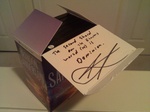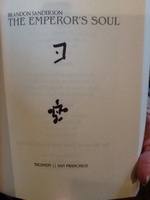Phillip Carroll
I have a personal question of my own. I'm LDS as well. After attending this meeting on worldbuilding, the primary problem is my faith that Joseph Smith wrote the Book of Mormon, because he really had six years to work on it, and I think that he had the ability to put that book together himself...
Brandon Sanderson
You know, yeah, a lot of people talk about there's no way that he could have done it. Being a fantasy writer myself, I don't think it's outside the realm of possibility that he could have written it himself, and I think basing your testimony, in the church, based on a concept like that is the wrong way to go. It is the wrong way to go, basing your testimony on, "Well, it's obviously impossible that he wrote it, therefore it must be true..." That's actually a bad logical way to look at the church.
I look at the church through eyes of faith, and my testimony is based solely on the fact that I believe God has spoken to me. I ask him, I say, "Is this what you want me to do," and I felt that testimony; I felt that burning inside, and for me, you know what, honestly, it doesn't happen that often for me. It's not like, you know, some people, they go to church, and every time it's like...no. I can point to three distinct points in my life where I felt that testimony, and other times I felt a good comfort, but there are three things where I said it was, you know, knock me down, this is true, that....and it wasn't even necessarily focused on the church. One was that I should be a writer, and one that I should be marrying my wife. The other one is very personal, so I won't mention that one, but those two moments I felt a powerful, powerful presence, and it came down to one of two things for me: either this is confirmation bias, which I assume you know about—either it's confirmation bias or it's the truth, and because if there is a God, he's not going to let me have this moment thinking that there....that, you know, this isn't going to be a lie. Either God is real and I'm feeling these sorts of confirmation...it really became that dichotomy for me, feeling those two things.
And from there, I just try to do the best I can. This faith has worked very well for me; I have not received any necessarily, moments saying "don't do this." There are lots of things in any religion—LDS faith is not alone in this—there are lots of things in any religion that are going to raise some eyebrows. You say, look, there's some logical holes here, and it doesn't matter which religion you're talking about; there's gonna be those. And because I've had those moments, those are what I have based, fundamentally, my faith upon, and honestly, for me, it's a choice between atheistic humanism, which has some very valid points, and the faith that I have now, and I only...you know, it's very Cartesian. Descartes, you know, "I think, therefore I am." I have to rely on my senses and my emotions, and feeling what I felt, if I say, "That's just confirmation bias," for me that means that I can't really rely on my senses, and I don't really want to go that way. I want to rely on what I have felt, and you know, on a more lofty scale I think there's more to it than all of this, than just this world. I think there's gotta be.
And that's, you know...who knows? Maybe the secular humanistic approach is right, and I have no problem with the secular humanists; I don't think that there's this....you know, these are generally sincere people who are interested in finding truth, but you know what, I believe that I can follow the scientific method for my faith. I can say, "Is this true?" I can pray. I can feel a confirmation, and it's repeatable. It's, every time I've wanted it, I've felt it. That's enough for me to go forward in faith right now. So, that's my version of a comment to you. I don't mind if you post that—I really don't; it's okay—but you know, I think we just do the best we can, and we soldier forward.


